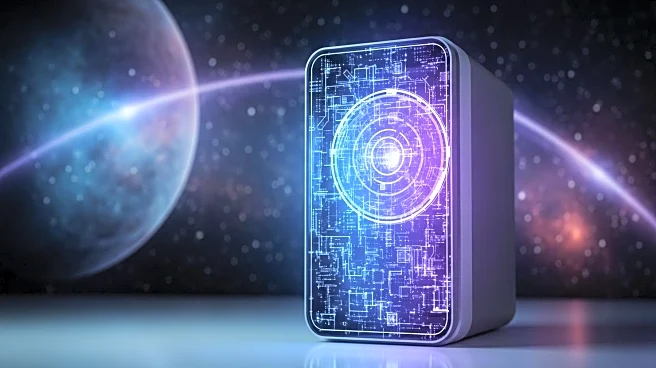What's Happening?
The Euclid Consortium, an international group managing the European Space Agency's Euclid space telescope, has published the most extensive simulation of the universe to date. This simulation, known as Flagship 2, maps 3.4 billion galaxies and tracks the gravitational interactions of over 4 trillion particles. Developed using an algorithm by astrophysicist Joachim Stadel from the University of Zurich, the simulation was run on the supercomputer Piz Daint. Since 2023, the Euclid space telescope has been mapping billions of galaxies, focusing on the distribution of dark energy and dark matter. The simulation aids in processing the vast quantities of data generated by Euclid, which scans about one-third of the night sky. The team anticipates that Euclid's observations will align with the simulation's predictions, although surprises are expected as the mission challenges the standard cosmological model.
Why It's Important?
This simulation is crucial for advancing our understanding of dark energy, a force driving the universe's expansion. Currently, dark energy is considered a constant in the standard cosmological model. However, Euclid's observations, which look back up to 10 billion years, may reveal new characteristics of dark energy. Such findings could lead to significant revisions in our understanding of the universe's composition and expansion. The simulation also supports the processing of Euclid's data, potentially accelerating discoveries in cosmology. As the Euclid mission challenges existing models, it could pave the way for new theories and insights into the fundamental forces shaping the universe.
What's Next?
Euclid's first observational data was released in March 2025, with the next set of data scheduled for publication in spring 2026. As the mission progresses, researchers will continue to analyze the data to uncover potential discrepancies in the standard cosmological model. The findings could influence future space missions and theoretical research in cosmology. Stakeholders in the scientific community are likely to engage in discussions and debates regarding the implications of Euclid's observations, potentially leading to new collaborations and research initiatives.
Beyond the Headlines
The Euclid mission and its simulation have broader implications for the field of astrophysics and cosmology. By challenging the standard model, the mission encourages a reevaluation of established theories, fostering innovation and exploration in scientific research. The simulation also highlights the importance of international collaboration in advancing space exploration and understanding the universe. As new data emerges, ethical considerations regarding the interpretation and application of these findings may arise, influencing public policy and educational initiatives in science.










